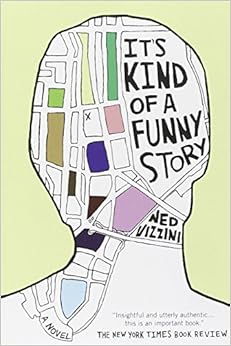I just finished reading Teen Angst? Naaah... by Ned Vizzini. It was a great book, full of funny stories alongside slightly embarrassing moments remembering just how awkward being a teenager was at times. I was definitely not a popular kid and didn’t come much out of my social shell until I reached sixteen.
If you haven’t heard of Ned Vizzini, he was a writer of three YA books. My best friend introduced him to me through his novel It’s Kind of A Funny Story which is a fictionalised account of a week he spent in a psychiatric ward after phoning the suicide hotline. The way he wrote the story, I assumed it was actually pretty similar to what happened. At the end of Teen Angst? Naaah... however, he wrote an epilogue detailing his achievements from writing that book (which is a set of chronologically ordered non-fiction short stories about his life during high school years) up until the point he wrote the epilogue several years later.
It turns out that the stress of a two book publishing contract is what sent him to the psychiatric hospital. After his time there, he churned It’s Kind of A Funny Story out record fast, using his new perspective and thought processes to fictionalise the different characters from different walks of life he’d met, and creating a pseudo-self who had different creative passions and different depression triggers.

He leaves the later added epilogue of Teen Angst? Naaah... with a lovely sense that he’s got his shit figured out:
‘Do I have days where I wake up and no Muses are there and I don’t even want to deal with my life anymore? Sure. Do I have days where I learn that something–some speaking engagement, some meeting, some project–has been canceled, or I’ve missed some opportunity, and I want to hit myself in the head for being such a dope? Sure. But above and beyond are the days when the words come together and I sit back in my chair and go, “Man, this is fun.” And there are the days where I get an e-mail or a letter from someone who read my writing and liked it and I just slap myself in the head for an entirely different reason, because I’m blessed.’
(that took a lot less time to read than write it out again.)
When I read this, it broke my heart. Ned Vizzini took his life a few years ago. I read this whole book knowing this fact, and I’m sure it added to the weight of emotion I felt in some parts. I can’t help but question now why we feel the need to tell stories in the way we do. Why we have to end everything with a happy tone.
Growing up with a question mark over my life expectancy started to make me view things in chunks of time. Like a beginning, middle and end of a book. When a chapter was finished, I’d move onto the next one, always seeking the next happy ending. I still do this to an extent, but it’s more organisational now than about needing to feel satisfied if my life were to suddenly end in a few months.
The path I’ve taken in recent years has led me to some great storytellers. People who really bring sentences to life, both on page and vocally. I love the art of storytelling, and I’m sure I always will. But it’s times like this I remember that there are endings for a reason, that even the epilogues can’t say what happens after – that maybe the next part ruins the magic of the meaningful ending.
Like right now? I’m going to put my pyjamas on, brush my teeth and go to bed. But that’s not as an exciting ending, is it? And I will have already done a bunch more things by the time I actually publish this.
(Which for the record, I did.)



















































